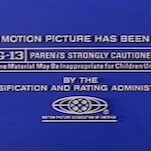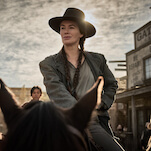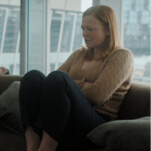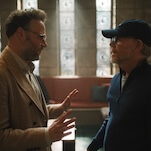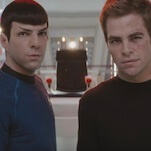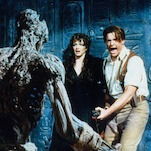I Am Trying To Break Your Heart

By now, the story has become music-industry lore—part cautionary tale, part barometer of the times. When Wilco, one of the most significant rock bands of its generation, handed its brilliant fourth album, Yankee Hotel Foxtrot, to Reprise, it was anticipating the sort of vigorous, all-fronts marketing campaign that only a major label can afford. Instead, the group's members were greeted with two weeks of ominous silence, finally broken by vague demands that they smooth out the dense, sonically adventurous production. Victimized by the corporate wrangling at AOL Time Warner, Wilco suddenly found itself without any champions at Reprise, and with a completed album hanging in indefinite limbo. The story has a happy, deliciously ironic ending: Yankee Hotel Foxtrot was picked up by another Warner label (Nonesuch) for three times the money, and it made its debut high on the Billboard charts on the force of Wilco's fan base and ecstatic reviews. On hand with a 16mm black-and-white camera to document the recording process, director/photographer Sam Jones came away with more than he bargained for in I Am Trying To Break Your Heart, a superb portrait of a band and an industry in flux. Though burdened by the weight of artistic and commercial expectations, Wilco's members (singer-songwriter Jeff Tweedy, guitar and keyboard specialist Jay Bennett, bassist John Stirratt, multi-instrumentalist Leroy Bach, and new drummer Glenn Kotche) head into the studio feeling cautiously optimistic. Granted an $85,000 budget and artistic freedom, they're allowed to record the album in the relaxed environs of a private loft, away from the prying eyes and ears of label suits and producers. But as the meticulous recording and fine-tuning wears on and the pressure to deliver starts to mount, a creative rift between Tweedy and Bennett, the band's two main collaborators, grows increasingly apparent, leading eventually to Bennett's acrimonious dismissal. Though he gets juicy post-mortem interviews with both parties—Tweedy cites Bennett's neediness, while Bennett claims Tweedy wanted his band back—Jones' camera wasn't present for the actual breaking point. But in a key scene, their frayed relationship shows in a scrap over a minor (though sublime) mixing transition into "Heavy Metal Drummer," one of presumably hundreds of little chips in the armor. Their separation comes over creative ambition rather than, say, a pool of vomit, which speaks both to the band's integrity and to the ultimate focus of Jones' documentary. Historic distractions aside, I Am Trying To Break Your Heart is first and foremost about the art and joy of making music, with extensive and crisply recorded footage devoted to songs in various stages of development and deconstruction. Stripped of the layers of discord that alienated Reprise executives, the opening track becomes a lovely acoustic folk song; with dual electric guitars, "Kamera" sounds more like a raucous outtake from 1995's A.M. than the plaintive version on the finished album. Above all, the documentary is a reminder that the small miracles of a great record come from artistic devotion and agonizing rigor, even if the sum ultimately falls on tin ears.



